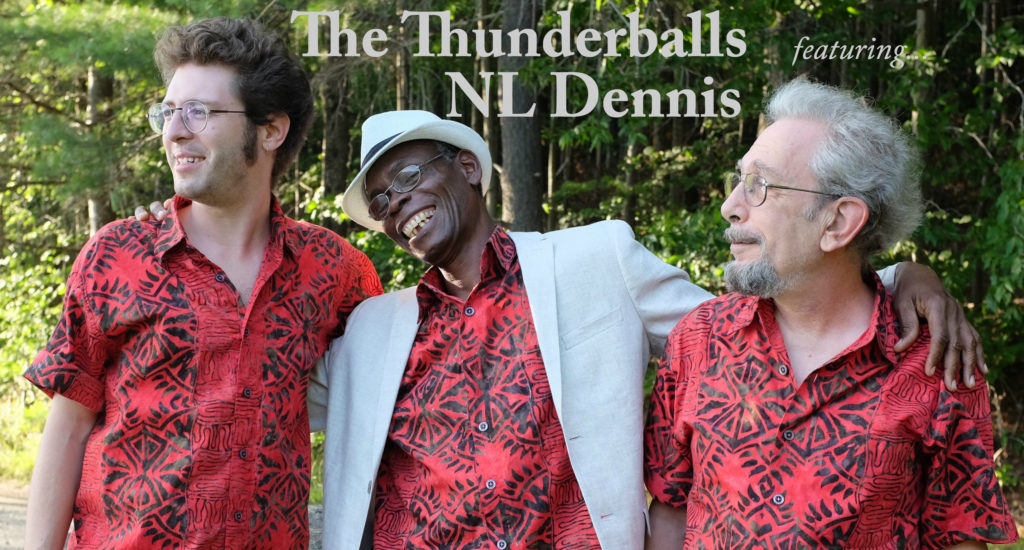History of the Thunderballs, Part 3: Meeting Dennis


It was a beautiful balmy night in early April – in Jamaica, not Vermont. In Vermont, April is when the snow begins to melt; they call it “Mud Season” (as if mud were a crop). That’s when the snow melts but there is still a layer of frozen ground beneath the surface, so the water doesn’t drain down into the earth and your dirt road becomes a track of mud.
However, such things are unknown in Jamaica. It was a warm and humid night, as most of them are, and the Girlfriend and I were strolling along the West End road when we heard the sounds of reggae music coming on the soft night air.
A brief listen revealed some “scratchy” sounding reggae, the sound coming from a low-fi system. But the rhythm was driving and insistent, and we stopped to listen. That driving rhythm was actually just one guitar, but it had a beat to it, a percussive snap that made you want to dance. That rhythm accompanied a singing voice like no other we had ever heard.
Though the whole sound was lo-fi and distorted, there was something about the voice that made me forget that fact. It had a beautiful clarity, a pitch-perfect-ness that settled on my ears like musical honey, and made me want to stay and listen.
“Let’s go sit down and listen to this guy,” said I to the Girlfriend.
And there was Dennis, skanking out the rhythm on his old Ibanez electric, and singing like an angel through his homemade sound system to an audience of…
Two, as we seemed to be the only people there. Dennis was singing a classic repertoire of reggae favorites. As I settled in to listening, I began to hear his voice more clearly, and quickly became a fan.
The first thing I noticed was the unique and distinctive sound; Dennis does not sound like anybody else and his voice is instantly recognizable. The second thing I noticed was his wide smile… finding joy in what proved to be a very enthusiastic performance. The rhythm of his guitar was hypnotic, insistent, metronomic… suitable for dancing; no need for a band!
And that fine-textured, soulful voice, full of feeling but in a natural style, free of exaggeration or artifice. And such effortlessly perfect pitch. It can be said of the top vocalists that the voice is truly a musical instrument, no less than guitar, piano or saxophone. Dennis’s vocal style is above all supremely musical and a joy to listen to on that basis alone.
As the evening progressed, a few more people came, stayed, drank, and a few danced. The crowd was small, but the applause was warm and genuine.
Dennis announced his last song, delivered, and bade the small but enthusiastic audience good night. As he was packing up, I walked up and introduced myself, and gave him a 5-star review of the show, which compliment he received graciously. I then asked him if he had any type of recording that he could sell at his gigs.
I was not interested buying a tape or CD, but rather wondering if he had any such thing to help increase the profitability of his performances (as is almost universal amongst American musicians.) I was not that surprised when the answer was no…nothing.
So I asked him if he would like a free recording session. I explained that I was a musician, not a recording studio owner, and that I had brought with me a simple but high quality recording setup. We would record in our rental cottage. The idea was to produce a CD, copies of which could be sold to the tourists.
I don’t know exactly what was going through Dennis’s mind at that moment. It’s not every day that a total stranger, a tourist from America, walks up to you and offers a recording session. Maybe he thought I was just another crazy tourist talking typical tourist trash, but he happily accepted the invitation.
The next day, with a microphone taped to a broomstick that was stuck into a plastic step-stool (I had no mic stand with me, and such things were impossible to purchase in Negril at the time), we recorded using a digital stereo tape recorder. The mic was in the left channel and his guitar was plugged into the right, and we recorded 14 songs, 13 covers and one Dennis original. While we were recording, the Girlfriend took some video, some of which footage survives.
Dennis told me that he didn’t use his name for performing, that he called himself “Taurus” after his astrological sign. So I came up with a bull logo
and photoshopped it onto his hat, which originally had the name of a tractor company, and used that for the cover of his first CD which is called, appropriately, ‘Taurus’.
It was a few years later, after the third Taurus CD we had made together, that one day I remarked that the sign of the bull, with its reputation for stubbornness, aggression and irascability, seemed especially unfit for a fellow known for gentleness, kindness, a sunny disposition and generally easy-going manner. So I Googled the sign, wondering if there was more to the Taurus sign than we knew about, only to find…
Ummm…Dennis is actually an Aries.

